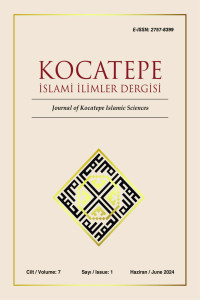Abstract
Bu makalede Kuzeydoğu Keşmir dağlarından Hint Okyanusuna dökülen Sind nehrinin doğu ve batısını kapsayan, belirli bölgeler dışında yaklaşık bugünkü Pakistan’ın tamamını içine alan bölgeye genel bir isim olarak verilen Sind bölgesinde yetişen bazı düşünürlerin modern dönemde Kur’ân-ı Kerîm’i anlamaya ve yorumlamaya dönük çabaları ele alınmıştır. Bilindiği üzere Müslümanlar tarafından Sind bölgesine ilk defa Hz. Ömer (ö. 23/644) zamanında denizden bir sefer yapılmış, daha sonra Müslümanların Sind bölgesine olan ilgileri Hz. Osman (ö. 35/656) ve Hz. Ali (ö. ö. 40/661) zamanında devam etmiştir. Sind bölgesinde önce Emevîler, ardından Abbâsîler hüküm sürmüş, bölgede Abbâsîler’in egemenliği zayıfladıktan sonra çeşitli Arap hanedanlıkları ortaya çıkmıştır. Sind bölgesinde tarih boyunca pek çok din ve kültür iz bırakmış olsa da bunların en kalıcısı İslâm kültürü olmuştur. Bu kapsamda bölgede Kur’ân’ın anlaşılması ve yorumlanması amacıyla pek çok tefsir kaleme alınmış, Kur’ân ilimleri ve tefsir usulü çalışmalarına katkı sağlayan ve tefsir tarihinde yer edinen önemli müfessirler yetişmiştir.
References
- Halepota, Abdulvahid J. “Sindhi 'Ulamas' Contribution Towards the Understanding and Interpretation of the Holy Qur'ān in the Modern Context”. Islamic Studies 21/4 (Winter 1982), pp. 1-18.
- Girhorî, Abdurrahim. Kelâm-ı Girhorî. haz. Umar Bin Mohammad Daudpota. Karaçi: Hükümet Sind, 1995.
- Sindî, Mevlânâ Ubeydullah. Makâm-ı Mahmûd. Ravalpindi: Safa-yı Akademi, 1995.
Sindhi 'Ulamas' Contribution Towards the Understanding and Interpretation of the Holy Qur'ān in the Modern Context
Abstract
This article deals with the efforts of some thinkers who grew up in the Sindh region, which is a general name for the region that covers the east and west of the Sind river, which flows from the mountains of Northeast Kashmir to the Indian Ocean and includes almost all of today's Pakistan except for certain regions, to understand and interpret al-Qurʾān al-Karīm in the modern period. As it is known, the first Muslim expedition to the Sindh region was made by sea during the reign of Umar (d. 23/644), and Muslim interest in the Sindh region continued during the reigns of Uthman and Ali. First the Umayyads and then the Abbasids ruled in the Sindh region, and after the Abbasids’ rule weakened in the region, various Arab dynasties emerged. Although many religions and cultures have left their mark on Sindh throughout history, the most enduring of these has been Islamic culture. In this context, many tafsīrs were written in the region in order to understand and interpret the Qurʾān, and important (mufassirs)interpreters who contributed to the studies of Qur’ānic sciences and tafsīr methodology and took their place in the history of tafsīr were raised.
References
- Halepota, Abdulvahid J. “Sindhi 'Ulamas' Contribution Towards the Understanding and Interpretation of the Holy Qur'ān in the Modern Context”. Islamic Studies 21/4 (Winter 1982), pp. 1-18.
- Girhorî, Abdurrahim. Kelâm-ı Girhorî. haz. Umar Bin Mohammad Daudpota. Karaçi: Hükümet Sind, 1995.
- Sindî, Mevlânâ Ubeydullah. Makâm-ı Mahmûd. Ravalpindi: Safa-yı Akademi, 1995.
Details
| Primary Language | Turkish |
|---|---|
| Subjects | Tafsir |
| Journal Section | Translation |
| Translators | |
| Early Pub Date | June 12, 2024 |
| Publication Date | June 15, 2024 |
| Submission Date | March 27, 2024 |
| Acceptance Date | June 7, 2024 |
| Published in Issue | Year 2024 Volume: 7 Issue: 1 |


